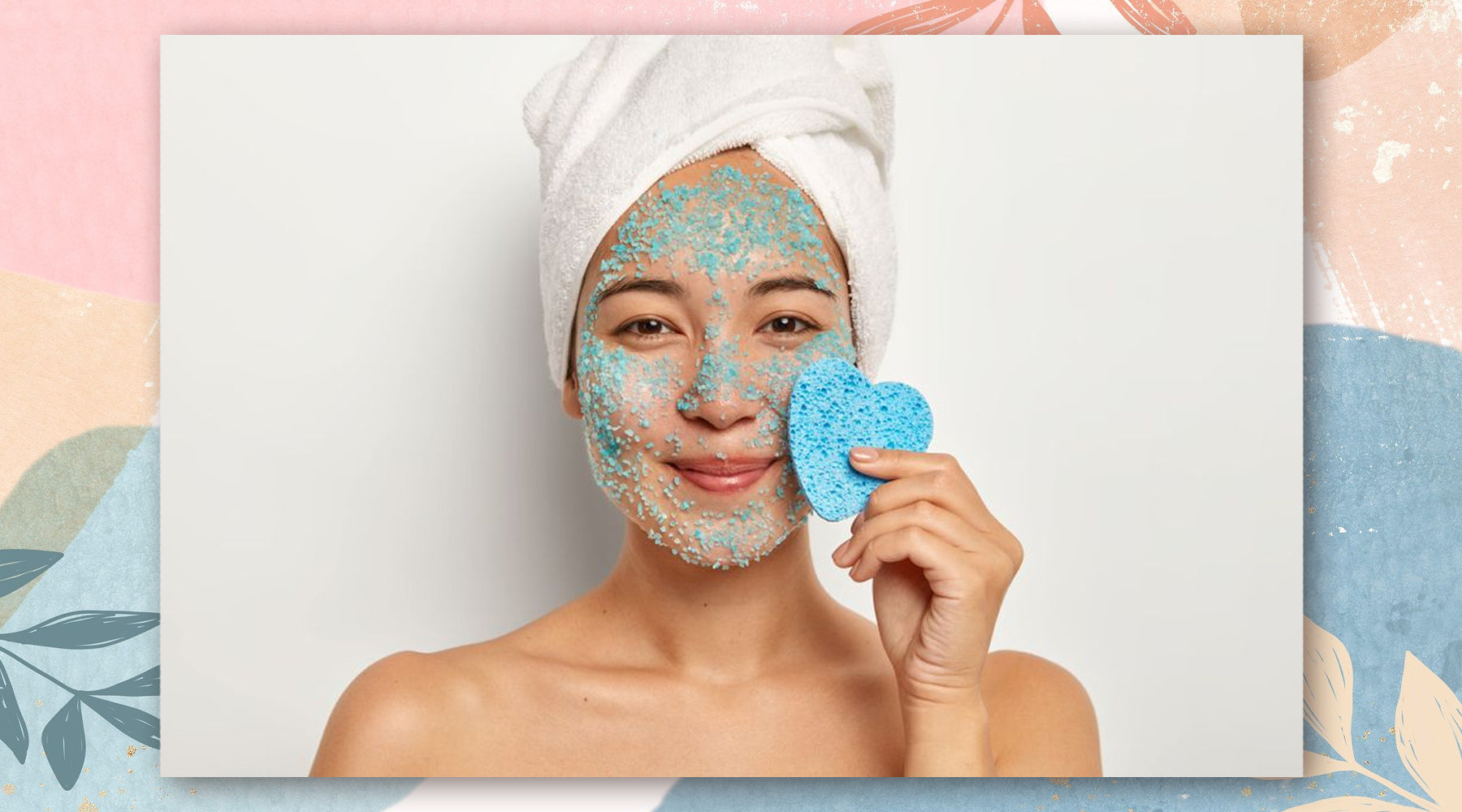
The Ultimate Guide to Exfoliating Your Skin the Right Way
Exfoliation is the key step that transforms dull, flaky skin to healthy and glowing. If you do not exfoliate regularly, chances are you’ll end up having rough, lackluster skin. Exfoliation sure does make your skin look radiant but it also helps in targeting many skin concerns such as breakouts, pimples, acne, blemishes etc. People with an oily skin type are prone to breakouts, clogged pores, blackheads and more and it is super important for them to take proper care of their skin. But exfoliation is as important for dry and combination skin as it is for oily skin. Whatever your skin type is, if you are looking for a set skincare routine to follow, worry not. We are here to the rescue! Our ultimate guide to exfoliation would answer all the questions you might have; from what it is all about, its benefits, the right kind of exfoliators to use and helpful tips and tricks. Read on...
Exfoliation Explained
Exfoliation is the removal of dead skin cells, dirt and grime from our skin surface. Our skin naturally exfoliates by shedding dead skin cells, revealing new skin through a 28-day cycle. Depending on our skin type or age along with change in climate, our skin's natural cycle of shedding these dead skin cells change. The dead cells accumulate on our skin surface and cause harmful bacteria to breed which in turn causes skin-related problems and can lead to skin dullness. When skin produces excess sebum, it makes shedding off the dead skin cells a bit more difficult, leading to higher chances of breakouts, acne, etc.
There are two types of exfoliants in the market today. While they both technically remove dead skin cells, lighten tan and help get rid of dirt and grime on skin, but they do so in different ways. Physical exfoliation is the removal of dead skin cells using a scrub, polish or brush. These can be in liquid, gel or cream form and have micro-beads or mild abrasive ingredients like sugar or coffee granules. Chemical exfoliation is a process wherein alpha hydroxy acids (AHAs), beta hydroxy acids (BHAs) or enzymes are used to help loosen the bond that holds dead skin cells together so that they can be totally removed. Chemical exfoliators come in the form of cleansers, serums and toners and are a great option for people with sensitive skin.
Why You Should Exfoliate Your Skin
If you want healthy glowing skin, proper exfoliation once or twice a week is the key! Exfoliation clears out clogged pores, fades acne scars and stimulates collagen production too. By removing the top layer of dead skin, debris and impurities from the skin, exfoliation also makes it easier for your toners, moisturizers, serums to sink in and make a difference to your complexion.
Benefits of Exfoliation
If you think that exfoliation is just about scrubbing your face, think again. Exfoliation has multiple benefits that deliver the best results if rightly done.
Unclogs blocked pores
Using an exfoliant to rid skin off impurities works wonders. The exfoliant helps to remove dirt, excess oil and grime from pores, cleansing them and opening them up. Clogged pores cause blackheads to form and exfoliating regularly will definitely help you reduce the chances of that.
Efficient absorption of skincare products
Using toners, serums and essences in mornings and at nights is pretty common. If the pores get clogged due to oil and dirt, the skincare essentials that you regularly use will not show maximum results. Cleansed pores enable these products to sink in deeply into the skin and provide maximum results.
Boosts blood circulation
Massaging is integral to exfoliation. Gently massaging your face with an exfoliant that's best suited for your skin type, will enhance blood flow that leads to the flushing out of toxins and improved skin health. Skin looks revived and fresh.
Smooths skin texture
Without proper exfoliation, dead skin cells can accumulate on your skin surface causing it to look dull, patchy, unhealthy and dehydrated. It also leads to the appearance of visible fine lines and wrinkles. Regular exfoliation of skin cuts down the buildup of these dead skin cells and keeps your skin smooth and healthy-looking.
Firms skin
As we age, our skin’s ability to produce collagen decreases which affects skin elasticity and firmness. Exfoliating helps to promote collagen production in skin that makes your skin look toned and firm. It also aids in keeping the visible signs of premature aging at bay.
Reduces dark spots
Hyperpigmentation in skin is an outcome of many environmental factors and hormonal imbalances. If you have a difficult sun tan or dark spots, you can gently exfoliate using a Vitamin C formula that will not only help fight hyperpigmentation but also boost radiance on skin.
Fights blackheads, acne & more
Overexposure to sun and stepping out in pollution every day affects our skin and causes skin blemishes. Learning how to exfoliate your skin the right way will help you tackle and reduce the appearance of pimples, blackheads, acne and other skin imperfections.
Homemade Natural Scrubs for Exfoliating Skin

Exfoliation is no tough task. It’s an essential step in your skincare routine and we cannot speak enough of how important it is to do it the right way. Over-exfoliating can damage and irritate your skin, and make it look patchy while under-exfoliating will not cleanse the pores properly. You can exfoliate in the comfort of your home using readily available ingredients in your kitchen or pantry.
Natural exfoliators like lemon, sugar, honey, yoghurt and oats are packed with nutrients such as vitamin C and D and hydroxy acids such as glycolic acid, lactic acid. You can apply them alone or mix them up with other ingredients to create your own DIY natural scrub for glowing skin. Natural homemade scrubs help to effortlessly remove tan, hydrate skin, soothe inflammation.
How to Properly Exfoliate Your Skin
- Selecting the right skincare product: Skin exfoliation can work wonders for your skin if you choose the right kind of face exfoliator based on your skin type. Though most skin types benefits from mild exfoliation, it's important to be mindful of intensity and frequency of exfoliating if you have persistent skin conditions like acne, rosacea or if you have extremely sensitive skin. Oily and combination skin can benefit a lot from exfoliation but overdoing can cause skin to dry out and may lead to irritation. Make sure you look for natural ingredients and potent skin benefiting actives like glycolic acid or salicylic acid in your face scrubs that can work to slough away dead, flaky skin and revitalize your complexion.
- Be gentle to your skin: If you use a face scrub or chemical exfoliator, apply the product gently using small, circular motions. Do this for not more than 30 seconds and rinse it off using lukewarm water. If you are new to the world of scrubs and exfoliators and want to try a mild yet effective skincare product that can deep cleanse, exfoliate and nourish your skin all-in-one, you can try our new Mon Cherry Overnight Peeling Mask.
- Follow with a moisturizer: To replenish the skin of the moisture it needs to function properly and to protect it from outside forces, it's necessary to keep the skin hydrated. Apply moisturizer and follow it up with a sunscreen (in AM skincare routine!) to ensure skin is supple, smooth and protected from environmental damage.




Leave a comment
This site is protected by hCaptcha and the hCaptcha Privacy Policy and Terms of Service apply.